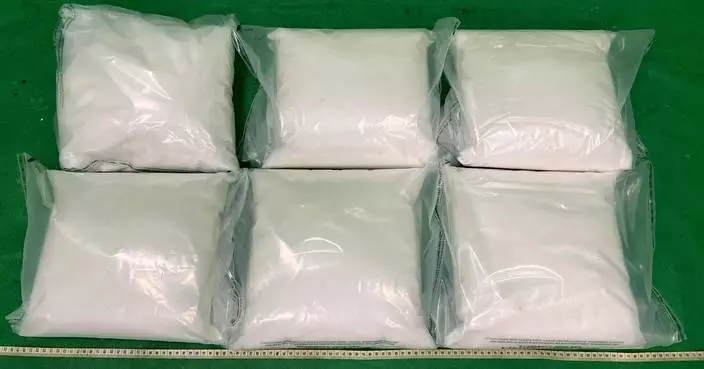Consumer Price Indices for October 2024
The Census and Statistics Department (C&SD) released today (November 21) the Consumer Price Index (CPI) figures for October 2024. According to the Composite CPI, overall consumer prices rose by 1.4% in October 2024 over the same month a year earlier, smaller than the corresponding increase (2.2%) in September 2024. The smaller increase in October 2024 was mainly due to the dissipation in this month of the low base effect arising from the rates concession and the waiver of the extra public housing rent payable in the third quarter of 2023 (i.e. from July to September). Netting out the effects of all Government's one-off relief measures, the year-on-year rate of increase in the Composite CPI (i.e. the underlying inflation rate) in October 2024 was 1.2%, larger than that in September 2024 (0.9%). The larger increase in October 2024 was mainly due to the upward adjustment in public housing rentals.
On a seasonally adjusted basis, the average monthly rate of increase in the Composite CPI for the 3-month period ending October 2024 was 0.1%, and that for the 3-month period ending September 2024 was 0.4%. Netting out the effects of all Government's one-off relief measures, the corresponding rates of increase were 0.2% and 0.1%.
Analysed by sub-index, the year-on-year rates of increase in the CPI(A), CPI(B) and CPI(C) were 1.6%, 1.3% and 1.2% respectively in October 2024, as compared to 2.9%, 2.0% and 1.6% respectively in September 2024. Netting out the effects of all Government's one-off relief measures, the year-on-year rates of increase in the CPI(A), CPI(B) and CPI(C) were 1.5%, 1.1% and 1.1% respectively in October 2024, as compared to 0.9%, 0.9% and 1.0% respectively in September 2024.
On a seasonally adjusted basis, for the 3-month period ending October 2024, the average monthly rates of increase in the CPI(A), CPI(B) and CPI(C) were all 0.1%. The corresponding rates of increase for the 3-month period ending September 2024 were 0.5%, 0.4% and 0.3% respectively. Netting out the effects of all Government's one-off relief measures, the average monthly rates of increase in the seasonally adjusted CPI(A), CPI(B) and CPI(C) for the 3-month period ending October 2024 were 0.2%, 0.1% and 0.1% respectively, and the corresponding rates of increase for the 3-month period ending September 2024 were all 0.1%.
Amongst the various components of the Composite CPI, year-on-year increases in prices were recorded in October 2024 for alcoholic drinks and tobacco (21.8%), electricity, gas and water (8.5%), miscellaneous services (1.9%), meals out and takeaway food (1.7%), miscellaneous goods (1.6%), transport (1.6%), and housing (1.0%).
On the other hand, year-on-year decreases in the components of the Composite CPI were recorded in October 2024 for clothing and footwear (-1.4%), durable goods (-0.7%), and basic food (-0.5%).
Taking the first 10 months of 2024 together, the Composite CPI rose by 1.8% over a year earlier. The respective increases in the CPI(A), CPI(B) and CPI(C) were 2.2%, 1.7% and 1.6% respectively. The corresponding increases after netting out the effects of all Government's one-off relief measures were 1.0%, 0.9%, 1.1% and 1.2% respectively.
For the 3 months ending October 2024, the Composite CPI rose by 2.0% over a year earlier, while the CPI(A), CPI(B) and CPI(C) rose by 2.6%, 1.8% and 1.6% respectively. The corresponding increases after netting out the effects of all Government's one-off relief measures were 1.1%, 1.2%, 1.1% and 1.1% respectively.
For the 12 months ending October 2024, the Composite CPI was on average 1.9% higher than that in the preceding 12-month period. The respective increases in the CPI(A), CPI(B) and CPI(C) were 2.3%, 1.8% and 1.7% respectively. The corresponding increases after netting out the effects of all Government's one-off relief measures were 1.1%, 1.0%, 1.1% and 1.3% respectively.
Commentary
A Government spokesman said that underlying consumer price inflation stayed modest in October. Food prices continued to record mild year-on-year increases, while the rate of decline of prices of energy-related items narrowed further. Price pressures on other major components remained broadly in check.
Looking ahead, overall inflation should stay mild in the near term. Domestic cost may see some mild upward pressures as the Hong Kong economy continues to grow. External price pressures should ease further, though uncertainties from the external environment remain. The Government will continue to monitor the situation.
Further information
The CPIs and year-on-year rates of change at section level for October 2024 are shown in Table 1. The time series on the year-on-year rates of change in the CPIs before and after netting out the effects of all Government's one-off relief measures are shown in Table 2. For discerning the latest trend in consumer prices, it is also useful to look at the changes in the seasonally adjusted CPIs. The time series on the average monthly rates of change during the latest 3 months for the seasonally adjusted CPIs are shown in Table 3. The rates of change in the original and the seasonally adjusted Composite CPI and the underlying inflation rate are presented graphically in Chart 1.
More detailed statistics are given in the "Monthly Report on the Consumer Price Index". Users can browse and download this publication at the website of the C&SD (www.censtatd.gov.hk/en/EIndexbySubject.html?pcode=B1060001&scode=270).
For enquiries about the CPIs, please contact the Consumer Price Index Section of the C&SD (Tel: 3903 7374 or email: cpi@censtatd.gov.hk).
Summer Family Cine Fest to take families on fantastical cinematic adventures
The Film Programmes Office (FPO) of the Leisure and Cultural Services Department will present the Summer Family Cine Fest (SFCF) from July 12 to August 16, offering over 40 fun-filled film screenings at the Hong Kong Film Archive, Hong Kong City Hall, the Hong Kong Science Museum, the Hong Kong Space Museum (HKSpM) and the North District Town Hall. The programme is one of the highlights of the International Arts Carnival (IAC).
The Feature Films section features 15 works. Blending animation and live action, "Diplodocus" (2024) tells the story of a cute little comic dinosaur, which, in order to save itself and its family, must help its creator regain his confidence to create. In the animated film "Into the Wonderwoods" (2024), while on the way to visit his grandmother, 10-year-old Angelo is accidentally left behind in the wild. With his imagination and courage, he embarks on a solo journey while braving monsters and demons in the forest.
In "Fox and Hare Save the Forest" (2024), a selfish beaver causes a flood in the forest, and other animals bravely come together to save their home. "Tummy Tom and the Lost Teddy Bear" (2024) follows a cat on an adventurous journey to find its favourite cuddle toy bear. In "Benjamin Bat" (2024), a little bat named Benjamin is bullied by his brothers for loving singing and becoming friends with a bat's sworn enemy, a bird. For himself and his friend, he needs to muster his courage to stand up against the odds. A cute penguin in "Thelma's Perfect Birthday" (2024) accidentally travels from the Land of Ice to the warm Great Forest and learns the meaning of growth through this whimsical journey.
"Buffalo Kids" (2024) from Spain tells the story of two young siblings and their disabled new friend teaming up to battle wits and strength against outlaws of the Wild West in a thrilling adventure of courage and inclusion. Starting from the parents of a young boy building a sailboat in their home garden, "A Boat in the Garden" (2024) tells a story of perseverance and dedication of a family of three in the pursuit of dreams.
The Swedish film "The Pinchers' High Voltage Heist" (2023) delivers a comedic portrayal of a quirky family of thieves and their hilarious lives together. In the award-winning "Coco Farm" (2023), three youngsters strive to build a business guided by conscience. In "Lampo, The Travelling Dog" (2023), a social media-famous dog and a sick girl cross paths at a train station, leading to a heartwarming tale of mutual care between human and canine. "Greetings from Mars" (2024) tells the story of how Tom turns his passion for space exploration into strength when his mother has to travel a long way away.
The SFCF also features three sports-themed films. "King Richard" (2021) depicts the parenting story of tennis superstars Venus and Serena Williams' father and coach, who meticulously guided them to success. Lead actor Will Smith won Best Actor awards at the Academy Awards, Golden Globe Awards and British Academy of Film and Television Arts Awards for his performance. "Lioness" (2023) follows a South American migrant girl in the Netherlands pursuing her dream of becoming a football player in a strange land. "The Hill" (2023) delivers a passionate and inspiring true story of a baseball prodigy overcoming adversity despite suffering from a degenerative spinal condition.
In addition, the FPO will co-organise with the HKSpM to present the dome show, "The Great Solar System Adventure!" (2024), at the Space Theatre of the HKSpM. Audiences will be guided through an exhilarating journey across the solar system. After the screenings, audiences will be invited to join a post-screening activity at the HKSpM Lecture Hall to make Mars paper models and learn about the major discoveries of various Mars exploration missions. This activity will be conducted in Cantonese.
Veteran dubbing artists Yip Ka-man and Kinson Lai will perform live Cantonese dubbing for "Thelma's Perfect Birthday", "Benjamin Bat" and "Into the Wonderwoods" with no subtitles. "The Great Solar System Adventure!" is in Cantonese, with English available through the headphone system, with no subtitles. Other films will feature Chinese and English subtitles.
Apart from the feature films, the FPO has hand-picked 20 animated short films from around the world to present three World Animation & Shorts programmes, titled "All About Love", "Is That OK?" and "Craving For Food!". Professional actor and drama tutor Man Jai (Raymond Chan) will host an introduction in Cantonese for the programmes.
The FPO will also present a two-day event titled Summer of Light: Cinematic Adventure at Sai Wan Ho Civic Centre on July 12 and 13. The event consists of free activities and ticketed workshops for the public to participate. Details will be available in early June on the FPO website www.lcsd.gov.hk/fp.
Tickets are priced at $88 and will be available from tomorrow (May 16) at URBTIX (www.urbtix.hk). For telephone bookings, please call 3166 1288. For programme enquiries and concessionary schemes, please call 2734 2900 or visit www.lcsd.gov.hk/fp/en/listing.html?id=75.
For details of other IAC programmes, please visit the website www.hkiac.gov.hk.

Summer Family Cine Fest to take families on fantastical cinematic adventures Source: HKSAR Government Press Releases

Summer Family Cine Fest to take families on fantastical cinematic adventures Source: HKSAR Government Press Releases

Summer Family Cine Fest to take families on fantastical cinematic adventures Source: HKSAR Government Press Releases

Summer Family Cine Fest to take families on fantastical cinematic adventures Source: HKSAR Government Press Releases

Summer Family Cine Fest to take families on fantastical cinematic adventures Source: HKSAR Government Press Releases




















































